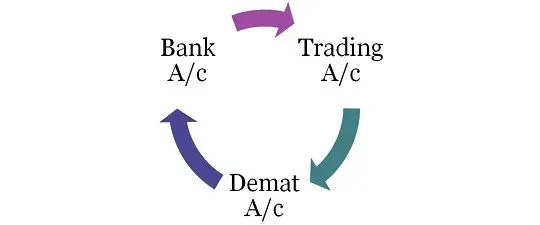About Bank Account Vs Demat Account
- Bank account
- Purpose: It is a bank account used for storing and managing money. It facilitates various financial transactions such as deposits, withdrawals, transfers, bill payments, and online transactions.
- Types of Assets Held: It holds funds in the form of cash, which can be deposited, withdrawn, or transferred as required. Some bank accounts may also hold fixed deposits, savings certificates, or other financial products offered by the bank.
- Regulatory Authority: Bank accounts are regulated by banking regulators such as the Reserve Bank of India (RBI) in India.
- Transactions: It involves deposits, withdrawals, transfers, and payments. Customers can use various channels such as ATMs, online banking, mobile banking, and cheques to conduct banking transactions.
- Interest and Returns: Bank accounts may earn interest on the funds deposited, depending on the type of account and prevailing interest rates. Some bank accounts also offer rewards or cashback on transactions.
- Demat account: It serves as a secure digital vault for holding various securities. It stores securities in electronic format, a process known as dematerialisation, effectively converting physical shares into digital assets.
- Purpose: A demat account is primarily used for holding and trading securities such as stocks, bonds, mutual funds, and exchange-traded funds (ETFs) in electronic form. It allows investor to buy, sell, and transfer securities seamlessly.
- Types of Assets Held: Securities held in a demat account are in electronic or digital form. These include stocks, bonds, debentures, mutual fund units, government securities, and other financial instruments.
- Regulatory Authority: These are regulated by securities market regulators such as the Securities and Exchange Board of India (SEBI) in India. Depositories like the National Securities Depository Limited (NSDL) and Central Depository Services Limited (CDSL) oversee the functioning of demat accounts.
- Transactions: It involves buying, selling, and transferring securities. Investors can trade securities on stock exchanges through their demat accounts.
- Interest and Returns: Demat accounts do not generate interest or returns on the securities held in the account. Returns are generated based on the performance of the securities held.
Q1: What is a security in a financial context?
It is a certificate or other financial instrument that has monetary value and can be traded. Securities are generally classified as either equity securities, such as stocks and debt securities, such as bonds and debentures.
Source: How is a demat account different from a bank account? Here are the key distinctions
Last updated on June, 2025
→ UPSC Notification 2025 was released on 22nd January 2025.
→ UPSC Prelims Result 2025 is out now for the CSE held on 25 May 2025.
→ UPSC Prelims Question Paper 2025 and Unofficial Prelims Answer Key 2025 are available now.
→ UPSC Calendar 2026 is released on 15th May, 2025.
→ The UPSC Vacancy 2025 were released 1129, out of which 979 were for UPSC CSE and remaining 150 are for UPSC IFoS.
→ UPSC Mains 2025 will be conducted on 22nd August 2025.
→ UPSC Prelims 2026 will be conducted on 24th May, 2026 & UPSC Mains 2026 will be conducted on 21st August 2026.
→ The UPSC Selection Process is of 3 stages-Prelims, Mains and Interview.
→ UPSC Result 2024 is released with latest UPSC Marksheet 2024. Check Now!
→ UPSC Toppers List 2024 is released now. Shakti Dubey is UPSC AIR 1 2024 Topper.
→ Also check Best IAS Coaching in Delhi






















